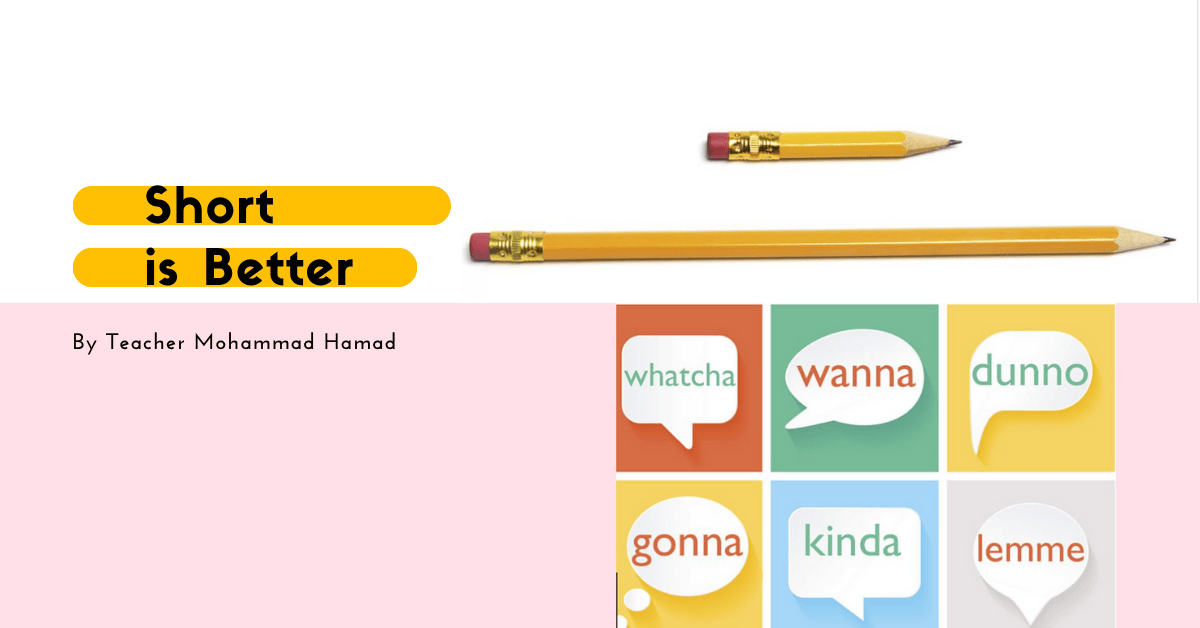Guess The Short Forms with This Fun Drag-and-Drop Game!
Read the examples on short forms and their full forms
| Concept | Definition | Example | Translation |
|---|---|---|---|
| dunno | don’t know | I dunno what happened | لا أعلم |
| Image | Video | Audio | |
| — | — | — | |
| gimme | give me | Gimme your book, please. | أعطني |
| Image | Video | Audio | |
| — | — | — | |
| gonna | going to | I’m going to travel next month. | سوف |
| Image | Video | Audio | |
| — | — | — | |
| gotta | got to (or: got a) | I’ve gotta go now. | يجب عليَّ |
| Image | Video | Audio | |
| — | — | — | |
| hafta | have to | Do you hafta go already? | يجب أن |
| Image | Video | Audio | |
| — | — | — | |
| kinda | kind of | She’s kinda nice. | إلى حد ما |
| Image | Video | Audio | |
| — | — | — | |
| lemme | let me | Lemme know what you think. | دعني |
| Image | Video | Audio | |
| — | — | — | |
| wanna | want to | Do you wanna watch too? | تريد |
| Image | Video | Audio | |
| — | — | — | |
| whatcha | What are you …. ? | What are you doing tonight? | ما الذي… |
| Image | Video | Audio | |
| — | — | — | |
×
![]()
Listen to this conversation and answer the questions
From BBC learningenglish.com. Hello and welcome to Six Minute Vocabulary with me, Finn, and me, Catherine.
And today we’re talking about short spoken forms, like “gonna,” “wanna,” and “gotta.”
Let’s start by listening to Jason and Yuki talking about their plans for the weekend.
Who is Yuki meeting on Saturday night? Have a listen.
“What are you doing this weekend, Yuki?” “I don’t know. I’m probably gonna meet Lucy on Saturday night.”
“All right. Do you wanna come to the cinema in the afternoon?” “No, thanks. I’ve gotta finish an English essay.”
“Okay, let me know if you change your mind.”
Well, that was Jason and Yuki. Who is Yuki meeting? She’s probably gonna meet Lucy.
English speakers often say “going to” as “gonna” in informal situations with friends.
Does that mean you shouldn’t say “gonna” in formal situations like job interviews?
Probably better to say “going to” in formal situations. And you don’t use “gonna” in writing unless writing dialogue.
Some people never use “gonna,” though it’s more common in American English.
You can only use “gonna” if “going to” is followed by a verb. E.g., “I’m gonna go to Paris.”
Now let’s hear more short spoken forms: “What are you doing this weekend?” “I don’t know. I’m probably gonna meet Lucy.”
Jason said “whatcha,” short for “what are you” or “what do you.” Yuki said “dunno” for “I don’t know.”
Next clip: “Do you want to come to the cinema?” “No, thanks. I’ve got to finish an English essay.”
We heard “wanna” for “want to” and “gotta” for “got to” or “got a.”
Another clip: “Let me know if you change your mind.” “Lemme” is short for “let me.”
Other short forms include “hafta” for “have to,” “gimme” for “give me,” and “kinda” for “kind of.”
Now quiz time: What’s an informal way to say “I’ve got to phone the bank”? Answer: “I’ve gotta phone the bank.”
How to ask what your friend is doing tonight? “What are you doing tonight?”
How to tell your friend you think it will rain? “I think it’s gonna rain.”
Well done if you got them all right! Before we go, remember: watch English TV, movies, and videos. Listen for short forms and practice repeating them.
It’ll help you understand better and sound more natural. There’s more at BBC learningenglish.com. We’ve gotta go now. Bye-bye!

